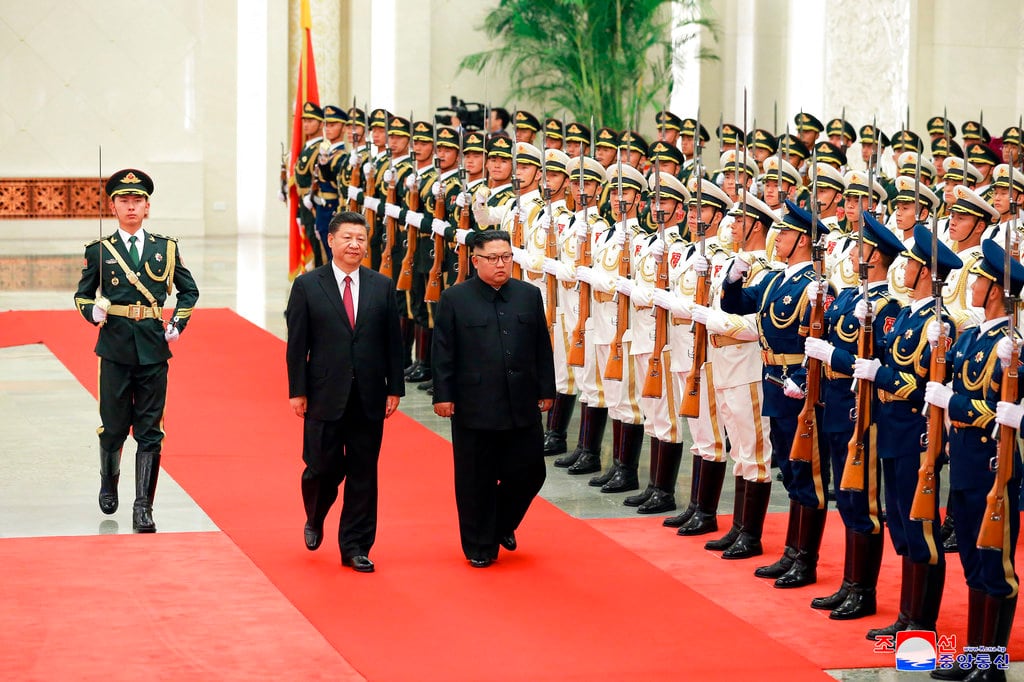WASHINGTON — The Trump administration on Thursday identified the missile test engine site that it says North Korea has pledged to destroy, but the president’s latest comments about resolving the nuclear standoff have raised new questions about what concessions Pyongyang has made.
President Donald Trump had said on June 12 after his summit with Kim Jong Un that the North Korean leader was “already destroying” a missile site, in addition to committing to “complete denuclearization” of the Korean Peninsula.
RELATED

The testing site in question is in Ch’olsan County, North Pyongan province, and is sometimes is referred to as the Sohae Satellite Launching Ground, according to an administration official. The official, who wasn’t authorized to discuss the issue publicly and spoke only on condition of anonymity, would not answer questions about whether the site was already being destroyed, but said that as negotiations moved forward, the administration would continue to monitor the area where North Korea tested liquid propellant engines for long-range ballistic missiles.
North Korea conducted satellite launches into space from Sohae in 2012 and 2016, drawing international condemnation as the rocket technology used could be adapted for use with ballistic missiles. There are also facilities there for testing missile engines. Commercial satellite imagery of the Sohae station from June 12 shows no apparent activity related to dismantlement of its rocket engine test stand, according to 38 North, a Washington-based website that tracks developments in the isolated nation’s weapons programs.
Trump boasted at a Cabinet meeting Thursday that his administration has had “tremendous success” with North Korea, adding that denuclearization had already begun.
The president’s comments, however, ran counter to remarks Defense Secretary James Mattis made the day before. Mattis told reporters Wednesday that he wasn’t aware that North Korea had taken any steps yet toward denuclearization. “I’m not aware of any. Obviously, we’re at the very front end of the process. Detailed negotiations have not begun,” he said.
Trump said Kim has stopped testing missiles, including ballistic missiles that could reach the United States, and is destroying the engine testing site — an apparent reference to Sohae. “They’re blowing it up,” he said.
Researchers are debating the significance of that promise.
It will depend on which facilities it destroyed at Sohae — one of several sites that have been used for the development of the North’s ballistic missiles, said Jenny Town, a research analyst on North Korea at the Stimson Center think tank in Washington.
“If it’s just the engine test stand at Sohae that will be dismantled, diplomatically it has value but it doesn’t really change North Korea’s ability to test more engines if they chose to do so at a different facility,” Town said.
“If they were dismantling more facilities at Sohae, such as the launch pad itself, that would be a very big development, as Sohae is their main satellite launch facility. It could signal North Korea is willing to include a moratorium on satellite launches in addition to their missile and nuclear tests, which has been a point of contention in past agreements and derailed negotiations in the past. But this is obviously a big if.”
At the Cabinet meeting, Trump also referenced other concessions North Korea has supposedly made: “They’ve already blown up one of their big test sites. In fact, it was actually four of their big test sites,” he said.
Trump undoubtedly was referencing North Korea’s demolition in late May of a nuclear test site at Punggye-ri in a remote area in the northeastern part of the country. But it’s unclear what Trump meant when he went on to say “it was actually four of their big test sites.”
Punggye-ri was built with multiple tunnels suitable for nuclear testing. During the demolition, a group of journalists, including from The Associated Press, witnessed a series of huge explosions that centered on entrances to three tunnels. The explosions caused landslides near the tunnel entrances and sent up clouds of smoke and dust.




